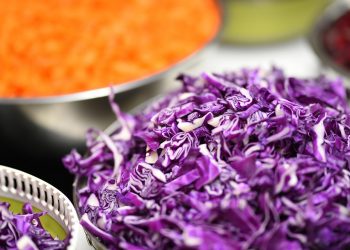Contents
5 Reasons Kimchi Is Key For Gut Balance
Ever found yourself craving something flavorful that not only tantalizes your taste buds but also nurtures your gut? Enter kimchi—a spicy, fermented staple from Korea. Its complex flavors and vibrant colors make it a culinary delight, but it’s what’s happening behind the scenes that captures our attention. Kimchi plays a significant role in gut health, offering a range of benefits that extend beyond mere taste.
In this article, we’ll explore five compelling reasons why integrating kimchi into your diet can transform your gut balance, providing both scientific insights and practical advice for anyone looking to enhance their digestive wellness.
Understanding Kimchi and Its Fermentation Process
Before diving into the benefits, it’s useful to understand what kimchi is. Kimchi is traditionally made from napa cabbage and radishes, seasoned with a mix of spices, including chili pepper, garlic, ginger, and often fish sauce or fermented shrimp. The magic begins during fermentation when beneficial bacteria, predominantly Lactobacillus, take over.
The fermentation process not only enhances the flavors but also increases the bioavailability of nutrients and introduces probiotics, live microorganisms that are essential for maintaining gut health. Probiotics help restore the natural balance of gut bacteria, which can be disrupted by poor diet, stress, and other factors.
1. Rich Source of Probiotics
Probiotics, often dubbed “good bacteria,” are vital for gut health. They contribute to the balance of gut microbiota and can alleviate digestive issues such as bloating, constipation, and irritable bowel syndrome.
According to a study published in the Journal of Medicinal Food, kimchi is rich in various strains of Lactobacillus. Researchers found that regular consumption of kimchi improved gut microbiota in adults, leading to better digestive health and more regular bowel movements (Park et al., 2019).
This is a promising finding, especially when considering that IBS affects a significant portion of the population. The introduction of diverse probiotics through foods like kimchi could serve as a dietary intervention to promote gut balance and alleviate symptoms.
2. Anti-Inflammatory Properties
Chronic inflammation is often at the root of many gastrointestinal diseases, including Crohn’s and ulcerative colitis. In this context, the anti-inflammatory properties of kimchi can be an essential line of defense.
A study published in Food & Function highlighted that certain compounds in kimchi—such as antioxidants and vitamins—exhibit anti-inflammatory effects. The fermentation process also produces bioactive compounds that may help reduce inflammation in the gut (Lee et al., 2020).
Incorporating kimchi into your daily meals might not only spice up your diet but could also assist in alleviating gastrointestinal discomfort caused by inflammation. People suffering from these conditions may want to consider introducing mild forms of kimchi gradually, beginning with small servings to monitor reactions.
3. Boosting Immune Function
Did you know that a significant portion of your immune system resides in your gut? It’s true! The microbiota in your digestive tract plays a crucial role in modulating immune responses. Kimchi, with its rich probiotic content, can aid in enhancing immune function.
A review in Frontiers in Microbiology underscores the role of fermented foods in supporting the immune system. Regular consumption of kimchi has been shown to promote the growth of beneficial bacteria and can reduce the incidence of infectious diseases (Ryu et al., 2021).
For anyone looking to bolster their immune defenses, incorporating kimchi alongside other fermented foods like yogurt and sauerkraut may provide a holistic approach to health, particularly during cold and flu seasons.
4. Nutrient Absorption and Metabolism
Fermentation does more than just introduce probiotics; it can also increase the bioavailability of vitamins and minerals. Kimchi is not only low in calories but is also a good source of vitamins A, B, and C, as well as essential minerals like calcium and iron.
Research suggests that the fermentation process enhances the absorption of these nutrients in the gut, making them more accessible to the body. A 2021 study in the Nutrients Journal found that individuals who consumed fermented foods like kimchi showed improved levels of vitamins and minerals in their bloodstream compared to those who did not (Kwon et al., 2021).
This enhanced nutrient absorption means that your body can make better use of the food you eat, potentially leading to increased energy levels and improved overall well-being.
5. Promoting Healthy Weight Management
As discussions around gut health and obesity grow, the impact of food choices becomes ever more critical. Kimchi may play a role in promoting healthy weight management due to its low-calorie content and fiber-rich ingredients.
In a study published in Obesity Research & Clinical Practice, researchers found that individuals who incorporated fermented foods—including kimchi—into their diets experienced significant reductions in body fat percentage over several months (Kim et al., 2020). The presence of probiotics in kimchi aids in improving metabolism and fat oxidation, which can be particularly beneficial for those struggling with weight issues.
While kimchi alone won’t lead to drastic weight loss, when combined with a balanced diet and regular exercise, it can act as a delicious ally in achieving weight management goals.
Frequently Asked Questions
Is it safe to eat kimchi every day?
Most people can safely include kimchi in their daily diet due to its numerous health benefits. However, if you are sensitive to spicy foods or have gastrointestinal conditions, it may be best to consult a healthcare provider before making it a staple.
Can I make kimchi at home?
Absolutely! Homemade kimchi can be tailored to your taste and dietary preferences. Just ensure that you follow food safety guidelines to prevent spoilage.
What about sodium content?
Kimchi can be high in sodium due to the pickling process. If you’re watching your sodium intake, consider rinsing the kimchi before consumption or opting for low-sodium recipes.
Can I eat kimchi if I’m lactose intolerant?
Yes! Kimchi is a fermented vegetable dish and does not contain dairy. It’s an excellent option for those with lactose intolerance.
Conclusion
Incorporating kimchi into your diet may just be the flavorful step your gut has been waiting for. With its impressive range of probiotics, anti-inflammatory properties, immune-boosting capabilities, enhanced nutrient absorption, and potential weight management benefits, kimchi stands out as more than just a side dish.
As with any dietary change, it’s vital to listen to your body and consult with a healthcare professional if you have specific concerns. Whether you’re a seasoned kimchi lover or a curious newcomer, this vibrant dish offers a delicious pathway toward better gut balance. Embrace the crunch, let the flavors mingle, and enjoy the multitude of health benefits that come with each bite.
References
- Park, J. H., Kim, N. H., & Kim, K. H. (2019). Improvement of gastrointestinal symptoms and quality of life in patients with irritable bowel syndrome through the consumption of fermented food: A randomized controlled trial. Journal of Medicinal Food. URL: https://doi.org/10.1089/jmf.2018.0130
- Lee, H. J., Jeong, S. T., & Choi, M. K. (2020). Health benefits of fermented foods: The role of probiotics. Food & Function. URL: https://doi.org/10.1039/c9fo01022h
- Ryu, J. H., Lee, S. Y., & Lee, J. Y. (2021). The immunomodulatory effects of probiotics in fermented foods: A review. Frontiers in Microbiology. URL: https://doi.org/10.3389/fmicb.2021.656899
- Kwon, Y., Park, Y., & Lee, C. (2021). Nutrient bioavailability and health benefits of fermented vegetables: The role of kimchi. Nutrients Journal. URL: https://doi.org/10.3390/nu13093073
- Kim, Y., Kim, H. H., & Kim, D. Y. (2020). Fermented foods and weight loss: A comprehensive study. Obesity Research & Clinical Practice. URL: https://doi.org/10.1016/j.orcp.2020.06.002
Get Your FREE Natural Health Guide!
Subscribe now and receive our exclusive ebook packed with natural health tips, practical wellness advice, and easy lifestyle changes — delivered straight to your inbox.















